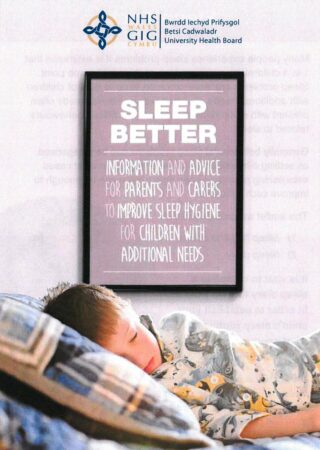Home Resources Project Reports Sleeping Better: Improving Sleep Habits in Children and Young People with Learning Disabilities using Cognitive and Behavioural Approaches
Sleeping Better: Improving Sleep Habits in Children and Young People with Learning Disabilities using Cognitive and Behavioural Approaches
| Leader(s) | Chris Catherall, Angharad Davies and Laura Brewerton |
| Location | Betsi Cadwaladr University Health Board |
| Duration | December 2012 to December 2013 |
| Received for Publication | March 2015 |
The central childhood disabilities service in North Wales provides specialist assessment services for children/young people and their families. This service has two distinct elements: early years (0-5 years) and school age (5-18 years). Children are referred to the early years’ service for assessment, diagnosis and intervention that primarily focuses on supporting the child’s development in the areas of cognitive and social functioning. Referrals to the school age service generally request specialist assessment of the child/young person’s behaviour that is deemed complex and challenging.
Referrals for the assessment and management of sleep disorders make up a large proportion of referrals to both service elements. Initially children/young people are generally assessed by the community paediatric service and are, on the whole, prescribed sleep medication, namely melatonin, as a first line treatment approach prior to referral to specialist nursing provision. However there is existing evidence, that such difficulties can be effectively treated and managed using a range of behavioural and cognitive approaches (Durand, 2008; Vriend et al., 2011). This evidence prompted the project lead to hold discussions with the Clinical Director regarding how the Children & Young Person’s Clinical Programme Group (C&YP CPG) could explore sleep, its management and outcomes for children and families. These discussions resulted in an agreement to set up a work stream to develop a coherent strategy which would standardise treatment and focus on employing cognitive and behavioural management approaches as a first line intervention for both typically and non-typically developing children.
As part of this work stream, the project lead applied to the Foundation of Nursing Studies (FoNS) to support the service change required to enable staff to translate the new strategy into practice. The objectives of the project were to explore the impact of sleep loss/deprivation on families; ascertain clinical staff knowledge of sleep assessment/sleep management prior to developing a training plan and pilot a telephone help-line. The team used a mixed method approach including a training needs analysis using a staff survey (nursing and clinical psychology), which yielded a 69% response rate. This analysis provided a valuable insight into current knowledge and practice that clearly indicated staff training needs. This analysis enabled the work stream to explore and commission appropriate levels of training for different groups of staff. The training delivered by Sleep Scotland was considered to be the most appropriate for the learning disability cohort due to the curriculum and teaching methods.
Five parent stories were collected and provided accounts of what it meant to live with a child who did not sleep well; these stories were analysed and three main themes emerged: ‘family impact, magnification and wishfulness’.The parent stories were used at training events and at work stream meetings to illustrate the impact poor sleep had on individual family members.
The project team asked the core nursing team to meet to discuss their claims, concerns and issues in relation to the project and proposed changes. This resulted in a change of direction for the project from the development of a telephone help-line to the establishment of a C&YP CPG wide childhood disability nurse led sleep clinic. The sleep clinics, whilst in their early stages of development have been operating weekly in ‘Central’ since September 2014. Parents are referred to the clinic and opt-in to a choice appointment once they have received a confirmation letter.
Lastly, the project team developed a sleep management information leaflet and booklet for families; they sought feedback from a range of sources: parents, clinical practitioners and the third sector. The feedback prompted significant changes to the language used and layout of the booklet before being submitted to the local health board for final approval. This is now being used at the nurse led sleep clinics.
This project was supported by the Foundation of Nursing Studies Patients First Programme in partnership with the Burdett Trust for Nursing.
Comments are closed.


